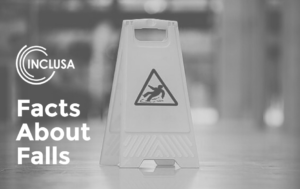Facts About Falls
Falls are leading cause of injuries in older adults
Falls are disturbingly common in older adults. According to the Centers for Disease Control and Prevention, one in four adults over age 65 fall each year and the results of those falls can be devastating.
In fact, falls are the leading cause of fatal and nonfatal injuries in older adults, with about one in five people suffering moderate to severe injuries—causing loss of mobility, long-term care and even death.
Common risk factors for falls among elder adults
The National Institutes of Health have identified the greatest risk factors. Addressing them could be key in preventing thousands of injuries each year, and they could be key in preventing yours.
Weakness, especially in legs
That’s why it’s critical that people exercise throughout their lives, including their senior years. Weight-bearing exercises can be especially helpful, particularly for people who have osteoporosis, and be sure to get sufficient calcium and vitamin D.
Balance and gait
Exercise can help here, too, with many experts specifically lauding the benefits of Tai Chi. Balance and gait issues, however, can also caused orthopedic issues, such as arthritis, so addressing those issues medically is also important.
Low blood pressure
Whether constant or upon standing, low blood pressure can lead to fainting and dizziness, both of which are common causes of falls. Low blood pressure can result from neurological conditions, illnesses or simple dehydration. Once you understand the cause of low blood pressure, your doctor can help you treat it. Just be sure to drink plenty of water in the meantime.
Declining eyesight
Most adults find their eyesight declines with age, but cataracts, glaucoma and depth perception issues can make it dangerous. In addition to seeing your eye doctor regularly, adapting your environment can help. Increase lighting in your home and eliminate tripping hazards, such as rugs, power cords and low-level furniture and décor.
Medications
The more medications you take, the more likely you are to experience interactions that may cause dizziness or drowsiness. Be sure to tell your doctor if you’re experiencing any of those symptoms. He or she may be able to adjust your medications to alleviate those issues.
Simple steps go a long way toward preventing falls
Another way to address several of these factors and reduce falls for anyone is to install rubber mats in your bathtub and grab bars throughout your bathroom. It’s also wise to add double railings to any stairs inside or outside your home.
As the saying goes, an ounce of prevention is worth of pound of cure. In this case, a few extra steps can make a tremendous difference in the quality and longevity of your life.
# # #


